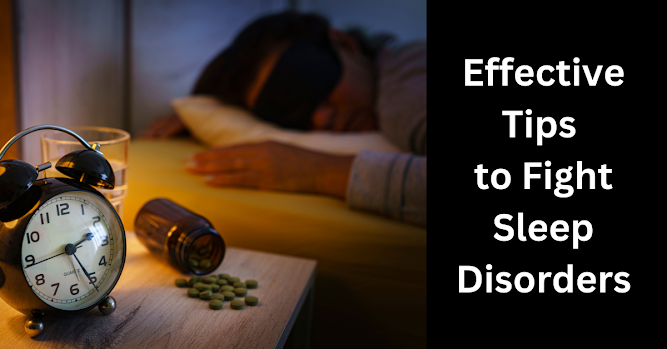Effective Tips to Fight Sleep Disorders and Achieve Restful Sleep
Sleep disorders can disrupt our daily lives, affecting our productivity, mood, and overall well-being. However, with the right strategies and lifestyle changes, you can fight sleep disorders and regain control over your sleep patterns. In this article, we will explore ten effective tips to help you combat sleep disorders and achieve restful, rejuvenating sleep. By incorporating these tips into your routine, you can optimize your sleep quality and wake up feeling refreshed and energized.
Stick to a Consistent Sleep Schedule: Maintaining a consistent sleep schedule is crucial for regulating your body's internal clock. Establish a consistent sleeping and wake-up time, including on weekends. Consistency helps establish a sleep routine, making it easier for your body to fall asleep and wake up naturally. Aim for seven to nine hours of sleep per night, adjusting the duration according to your individual needs.
Limit Daytime Napping: While short power naps might be beneficial, prolonged daytime napping can disturb your sleep-wake cycle. If you struggle with sleep disorders, avoid daytime napping or limit it to 20-30 minutes early in the afternoon. This helps maintain your sleep drive and ensures that you are tired enough to fall asleep at your desired bedtime.
Create a Relaxing Bedroom Environment: Your bedroom should be a sanctuary for sleep. Remove any clutter, work-related items, or other distractions that can contribute to stress or anxiety. Use calming colors and incorporate elements that promote relaxation, such as soft lighting, pleasant scents, or gentle background music. Designing your bedroom as a tranquil space dedicated to sleep can positively impact your sleep quality.
Limit Stimulants and Alcohol: Stimulants like caffeine and nicotine can interfere with your ability to fall asleep and stay asleep. Avoid consuming caffeinated beverages, such as coffee, tea, or energy drinks, in the afternoon and evening. Similarly, limit alcohol consumption, as it can disrupt the sleep cycle and lead to fragmented, restless sleep.
Exercise Regularly: Regular physical activity is beneficial for sleep. Engaging in moderate-intensity exercises, such as brisk walking, jogging, or yoga, can help reduce stress, promote relaxation, and improve sleep quality. Aim for at least 30 minutes of exercise most days of the week, but avoid vigorous exercise close to bedtime, as it may energize your body and make it harder to fall asleep.
Evaluate Your Sleep Environment: Assess your sleep environment for any factors that may contribute to your sleep disorder. Consider factors such as noise, temperature, bedding comfort, and light exposure. Make adjustments as necessary, such as using earplugs or a white noise machine, adjusting the thermostat, or investing in a supportive mattress and pillows.
Seek Professional Help: If your sleep disorder persists despite implementing these tips, consider consulting a healthcare professional or Psychologist Sleep Specialist in Coimbatore. They can help diagnose and treat any underlying conditions contributing to your sleep disorder. They may recommend therapies such as cognitive-behavioral therapy for insomnia (CBT-I), medication, or other interventions tailored to your specific needs.
Electronic Devices: The blue light emitted by electronic devices, such as smartphones, tablets, and computers, can suppress the production of melatonin, the hormone responsible for regulating sleep. Excessive use of electronic devices before bed can disrupt your sleep patterns and make it harder to fall asleep. Establishing a digital curfew and avoiding electronic screens for at least an hour before bedtime can improve your sleep quality.
Medical Conditions and Medications: Certain medical conditions, such as sleep apnea, restless leg syndrome, depression, and chronic pain, can contribute to sleep disorders. Additionally, some medications, such as those used to treat asthma, allergies, or depression, may have side effects that disrupt sleep. If you suspect an underlying medical condition or medication is affecting your sleep, consult with a healthcare professional for appropriate diagnosis and treatment.
Identifying the triggers of sleep disorders is crucial for effectively managing and improving sleep quality. By addressing common triggers such as stress and anxiety, irregular sleep schedules, poor sleep environments, stimulants, electronic devices, and underlying medical conditions, you can take proactive steps toward achieving restful sleep and restoring balance to your life. Prioritizing good sleep hygiene and seeking professional help when necessary can lead to significant improvements in your overall well-being.




Comments
Post a Comment